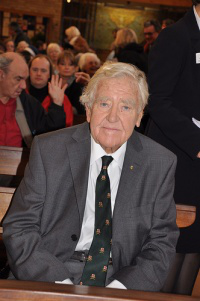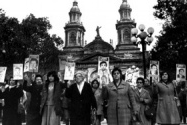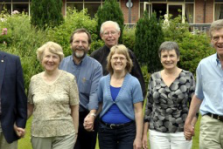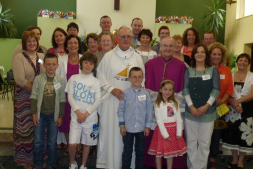Text: Rt Hon Tom Clarke MP on 40th anniversary of first Disability Act

Lord Morris of Manchester, who was responsible for the first disability legislation
The Rt Hon Tom Clarke MP gave the following address today at Holy Apostles, Pimlico, London.
It is highly appropriate that in this, the 40th Anniversary of the enactment of the Chronically Sick and Disabled Persons’ Act 1970, we gather at this uplifting service, in this wonderful church.
We give thanks for such an important piece of legislation, and seek to ensure that there will be further changes correcting the discrimination which existed then and which, Lord Morris continually reminds us, has not yet been put right.
40 years ago the Rt Hon Alf Morris skilfully used his position in the ballot for Private Members Bills in the House of Commons to seek to put this legislation on the statute book, and to influence the then Labour Government to give its full support.
As one who has had a little experience in piloting Private Members Bills through Parliament, I recognise that, whatever Government is in power, what Alf Morris achieved was no easy task.
Indeed, when I had the privilege of leading for the then Opposition in a debate on the 25th Anniversary of Alf Morris’ Act, that very distinguished Parliamentarian Tam Dalyell intervened.
He said: “what Mr Morris did, frankly, persuade people against their better judgment.” Tam also paid: “tribute to several civil servants in the then Elephant and Castle.”
Alf’s Act was not only a hugely important piece of legislation, but it has the great merit of having inspired other Members of Parliament to introduce further socially progressive Bills in the years that have passed.
In 1970 the argument was about whether disability discrimination existed.
Today such legislation is properly focussed on putting things right.
Alf’s great gift was to bring together so many individuals and so many organisations in the disability field – indeed too many to mention today – that the gap which then existed between legislators and those that they sought to serve could be bridged.
The Act which Alf produced represented the first legislation anywhere in the world to deal with disabled people’s access to buildings.
Indeed, the issue of access was put on the agenda for the first time.
Those responsible for the design and construction of buildings of all kinds began to ask themselves what they could or should do to make buildings accessible.
Likewise, on mobility and transport, the 1970 Act broke the barrier and made future advances possible. The orange badge scheme, which arose directly from the Act, has given the benefit of parking concessions to many millions of disabled people in Britain. Accessible transport became a practical reality rather than a dream.
Dyslexia and autism were recognised in legislation in this country for the first time; the world’s first Institute for Hearing Research was created; and disabled people were given statutory rights to adaptations to their homes.
It was not surprising when Harold Wilson appointed Alf as the first ever Minister for Disabled People’s Rights.
It is often said that the many debates when Alf became involved brought out the best of the House of Commons and more often than not achieved a cross-party consensus.
That is the measure of the man whom we honour today.
Alf would say that without the support of many, many people, most of all his wife Lady Irene, much of this would not have been achieved.
Today we gather together to express our gratitude to Alf and Irene and all who made such progress possible.
And Alf, we will never forget what you said in that wonderful speech on the 25th Anniversary of your Act: “Unfair discrimination leaves disabled people doubly disabled. That is morally wrong and what is morally wrong ought surely no longer to be legally permissible in Britain.”
That remains our inspiration, our hope and our prayer.
Source: Archbishops' House





















